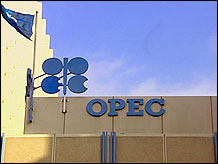|
|
|
|

|
| OPEC ministers are meeting in Vienna amid concerns over high oil prices. CNN's Robyn Curnow reports (September 19) |
Play video
|
|
|
|
|
|
NEW YORK (CNN/Money) -
While OPEC ministers met in Vienna Monday to discuss future production and price targets for oil, oil analysts and traders were instead focused on the waters off the Florida Keys.
There Tropical Storm Rita had the potential to turn into a hurricane and again pound oil production and refinery capacity along the U.S. Gulf Coast. Private weather tracking service Weather 2000 Inc. estimates that Rita's path could hit four times as many energy rigs and platforms in the Gulf as Hurricane Katrina and 2004's Hurricane Ivan combined. Both those storms sparked record oil prices in their wakes.
"With another storm threatening the half the Gulf that avoided Katrina, it has traders spooked this morning," said oil analyst Peter Beutel of Cameron Hanover about Monday's sharp rise in oil prices.
But even if Rita misses oil faculties, traders and economists say that the once all-powerful oil cartel's official pronouncements have no real impact on the market and the price of oil.
"OPEC became powerless the moment it sold its last barrel of excess capacity, and that was maybe a year ago," said energy economist A. F. Alhajji, a professor at Northern Ohio University.
"They have at this point ceased to be a meaningful cartel at these prices," Beutel agreed. "The only reason they hold these OPEC meetings is have an excuse to get out of their own countries, go to Vienna and go on a shopping spree."
With most of the OPEC member nations already operating at capacity, the power of the cartel to lift prices by keeping supply artificially low is lost, said economists. OPEC officials say they're looking for lower, rather than higher prices, so production cuts are not on the table. And even if OPEC did want to cut production, it's unlikely members would pass up the chance to sell the maximum amount of oil possible at current prices.
While most oil ministers from OPEC countries are bullish about future production levels, there are growing doubts about what OPEC can and will be able to do to increase production.
"The bigger question is does OPEC have excess capacity that it can tap into in the longer-term," said Jason Schenker, a Wachovia Securities economist in Vienna for the OPEC meetings. "It appears they're unlikely to raise their quotas, and that's not going to assuage market concerns about their capacity."
Bill Adams, chief energy and capital market strategist, LaSalle Futures, said that OPEC nations are limited in how much they can increase capacity because they could hurt the quality and quantity of oil they can extract from fields long-term if they try to remove too much, too quickly.
"Overproduction can lead to a production collapse," he said. That makes promises of future production increases seem somewhat hollow, he said.
"I think if they had the capacity to meet the demand that exists right now, they would have done it already," he said. "It doesn't take a rocket scientist to figure out that China is going to have huge increased energy needs. If they haven't taken advantage of it, you have to assume they're not able to."
While the recent spike in oil prices would appear to be good news for OPEC, the economists say it poses a risk for many of the OPEC nations. If consuming nations go into an oil-shock sparked recession, it could cause a sharp drop in demand, and maybe even government regulation of energy consumption.
"In the long run it'll be a disaster for [OPEC producers]," said Alhajji. "Demand will start decreasing, economies will start collapsing, then they will suffer as they did in the 80s."
So OPEC could be faced with the seemingly contradictory problems of not being able to meet world demand today, and having weaker prices in the future even if production stays relatively steady.
The current oil prices are enough to cause some nations, particularly in Europe, to be looking at oil price regulation and other controls, as well as more significant government investment in alternative energy, said Fadel Gheit, oil analyst at Oppenheimer. That's got the potential to hurt some OPEC countries more than the current prices are helping, he said.
"They don't want to trigger projects that take even 1 or 2 percent off of demand," he said. He and Alhajji said even that small percentage of current oil usage being by alternative energy can have a serious effect on long-term oil prices.
"Prices are determined at the margin. We don't need a lot of alternative energy to depress prices," he said.
While some economists and traders now believe that $40 a barrel is the new floor for oil prices, Gheit said prices still have the potential to fall below those levels, and that could cause some regimes to fall.
"These governments are totally unpopular and repressive. The only thing they have going for them is buying stability, throwing money at their friends and enemies," said Gheit.
For a look at whether $3 a gallon gasoline is here to stay, click here.
For a special report on this year's oil crunch, click here.

|